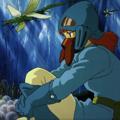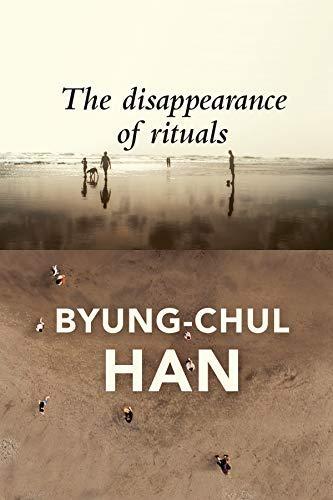nausikaa@wyrmsign.org (e)k Byung-Chul Han(r)en The Disappearance of Rituals: A Topology of the Present liburuaren kritika egin du
Punchy, stimulating, provocative: making oneself at home in time
4 izar
Having only seen the titles of Byung-Chul Han's other essays, I wonder whether he has only ever written one text, iterated and extruded into several compact volumes. From its point of entry at the loss of ritual under neoliberalism, this short book seems to take Han through familiar territory: transparency contra ambiguity, authenticity and narcissism contra community, production contra play. I feel that the concept of ritual houses the conversation well (along with play, which ritual seems to transmute into around the fifth chapter, titled ‘A Game of Life and Death’). Rather than presenting rituals nostalgically, as a form to return to, in this essay they “serve as a background against which our present times may be seen to stand out more clearly,” according to Han’s ‘Preliminary Remark’ at the start. In fact this foreword sets a clear and accurate expectation for the entire essay, which in itself shows Han’s …
Having only seen the titles of Byung-Chul Han's other essays, I wonder whether he has only ever written one text, iterated and extruded into several compact volumes. From its point of entry at the loss of ritual under neoliberalism, this short book seems to take Han through familiar territory: transparency contra ambiguity, authenticity and narcissism contra community, production contra play. I feel that the concept of ritual houses the conversation well (along with play, which ritual seems to transmute into around the fifth chapter, titled ‘A Game of Life and Death’). Rather than presenting rituals nostalgically, as a form to return to, in this essay they “serve as a background against which our present times may be seen to stand out more clearly,” according to Han’s ‘Preliminary Remark’ at the start. In fact this foreword sets a clear and accurate expectation for the entire essay, which in itself shows Han’s restraint in interpreting the scope of his own insight. You’ll find the same throughout the writing ,where you may think Han is gesturing at something grander and harder to swallow than what’s written. The pace of the writing adds to this effect: assertive, compact, scarcely done dropping one take at your feet before moving on to the next. But he avoids getting carried away.
I wouldn’t be the first to hold up Han’s content—criticizing neoliberal time, with its compulsion toward incessant production, the disappearance of lingering—against the form, namely, a volume which consists roughly of a series of blog posts. I don’t find any irony there: the compactness itself allowed me to read the book in the time and attention I had available. That being said, Han wastes no ink on extravagances of exposition or conclusion.
The chapters of this essay proceed like the petals of a flower, all spoked from the same theme, each one lapped partly under the one before, setting out in its own arc, folding back into the same center. With the exception of the first two—titled “The Compulsion of Production” and “The Compulsion of Authenticity”—the chapters hardly build on each other. Minus a couple misses, they each a elaborate a vigorous, fresh, scholarly story of opposition (or, difference?), then stop. At first, I kept shaking the little book and thinking “say more!” As I made my way through, though, I got used to the snug horizons of Han’s willingness to explain. Perhaps I was participating, after all, as the neoliberal reader he critiques, for whom “even reading is acquiring a pornographic form”, where “the pleasure of reading a text resembles that of watching a striptease” (86). If you’re looking for “a progressive unveiling of truth as though it were a sexual organ” (86), you may find it challenging as I did.
Within this succinct frame, Han seduces us toward some novel and sometimes startling notions of time, self, sociality, war, death, meaning, and so on. All the critical theory hits, really. For Han, the compulsion of production—and its intensified progeny, the compulsion of authenticity—drive us away from symbolic forms which connect us to the world beyond ourselves, the same forms which allow for intensive experience, the “search for as yet unnamed forms of life and play” (54). Instead, under neoliberalism—and Han specifically aims at ‘neoliberalism’, even while tracing its genealogy through the Enlightenment to Plato, as is only proper—the “narcissistic retreat into the ego” and the death of play amidst the profusion of work damn us to a “hell of the same.”
Maybe here you’ve whiffed the notes of Foucault, Bataille, Deleuze, and Baudrillard. Han draws from these ancestors while also adeptly constellating a handful of writers from eclectic backgrounds. His broad reading only makes me admire the brevity and coherence all the more, even if at points it feels as though we follow a few too many rabbit trails to somewhere oddly specific and tenuously related to the rest.
Even if you’re on board with the broad Left-critical view of, e.g., history, work, time, this essay manages to blindside you with some challenging ideas. For my part, it was his praise for politeness and social ritual, the “play of semblance”; as well as the approving depiction of ritual combat. Like any form of life that de-centers the self, I feel at a loss for reference points, for experiences to affirm and draw upon, and further at a loss to imagine entering into forms of life that enfold such concepts as community and recognition without losing one’s way amidst the herd. Still, the notion of politeness-as-ritual which “resembles a magical incantation that produces a positive mental state” (23) as an antidote to the “cult of authenticity” at the very least intrigued me, and left me with something to chew on.
At many points, of course, I found myself agreeing vigorously with Han. His characterization of Hegel as fixated on work at all levels of understanding “because he is a philosopher of modernity” (57) is such a beautiful take down of an entire tradition that I am implicitly and naively hostile toward (and never want to read). His invocation of Foucault with respect to symbolic exchange with death, “de-psychologizing oneself,” and so on, hit home. Also beautiful and new to me was the idea, near the open, of making oneself at home in time; I find myself with some solid ground on which to start inventing rituals that might begin to mean something (c.f. my someday review of Goatwalking and Heschel’s The Sabbath).
At the end, this left me hungry for more even whilst well nourished for thought, despite the occasional veering into the confusing.

